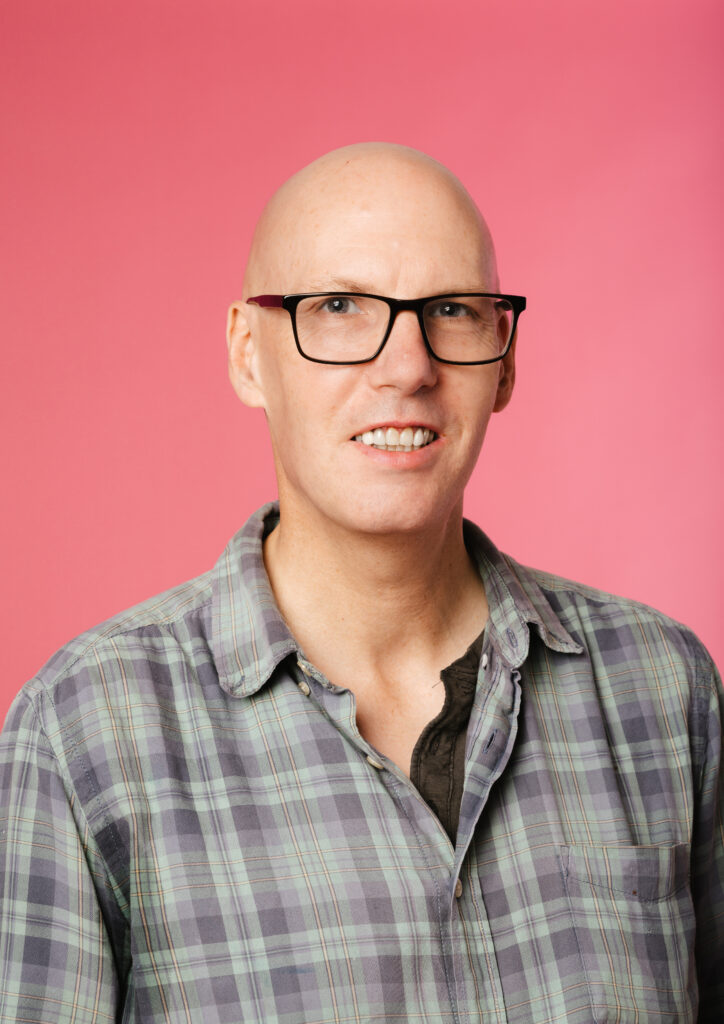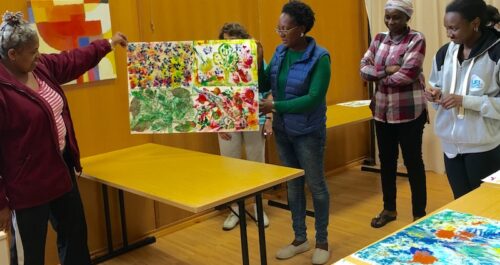

Steve Marriot
ST: Steve Marriot
INT: Interviewer
INT: Steve, tell us about yourself. What is your background?
SM: Em, I don’t really have a background.
INT: Where were you born?
SM: Eh, Silvertown, Plaistow.
INT: Were you educated in this area?
SM: I didn’t really get on with school, so I was quite glad when left. I drifted, like I did through school, a bit aimless. Then I started to take up art. I use to write a lot , that was my main thing, then I got blocked and someone said if you can write you can draw, so that’s what I did and the paintings started getting bigger. Then, eventually, I found my way to Rosetta as a volunteer. Someone said there’s this person called Yvonne, she’s a bit mad, but she’s good, so em, so I came along thinking I’ll give it a try and that I would last a week and I’m still here.
INT: So, you approached Rosetta. What were you hoping for back then?
SM: I just wanted to carry on. I was started to get ambitious with the painting and stuff like that. There was a good atmosphere, it was an actual studio and people were working on these huge paintings, and I thought, I’d like to work that big and em, I came along. I thought I would come along and try things, but Yvonne had this way of making you do the A-level, so I stayed and did the A-level – which was the highest thing I’d ever had at that time, cos I really didn’t do very well at school. So, that was my biggest achievement and she talked me into doing that. Yvonne liked what I was doing as she was a bit crazy and out there with her work. She used different materials. I remember one project. I went over the Green Way and collected all these bits of rubbish and things stuffed in me pockets and came back ready for the still life and eh, and I think she liked that, so when I finished the A-level, she invited me come back as a painter, to have a space, to share with others, and I was looking up at others, I looked up at the others at the really whacky paintings, and thought it my chance to do that and be one of those people.
INT: You are smiling now Steve. Why are you smiling?
SM: I’m smiling because it’s a long time since I thought about it and, eh, I remember just being, em, in a way, not even not thinking of myself as an artist at the time, but knowing I just wanting to do that work. Even when I was doing exhibitions, it seemed above me for some reason, I just really enjoy that feeling that and going for it.
INT: How long have you been involved in Rosetta?
SM: I’ve been involved since 2000 or just before, 1999.
INT: Can you describe the roles you have had here?
I was a student, then I did some City and Guilds courses and then I was exhibiting as I was involved in a group that Yvonne formed. Then I did teacher training, then, in the last couple of years, Yvonne wanted a technician, she wanted me to do it, so I ended up as her technician. When she left and Sanaz and Trish took up, that’s when I came in as a Director for a year. It didn’t suit me as I had too many hats. When I get too involved in being a Director, I not gonna be able to paint any more. I think that’s what I do. Sometimes I forget that I was. Director.
INT: Describe your artwork.
SM: Em, so yeah, it can be very dark. I’m into horror movies and that factors in, and em, textures as well, an em, it’s sort of changed, but in keeping within a body of work, its always had that dark edge to it. So, I have used a lot of different mediums in the past.
INT: How has Rosetta Arts continued to help you with your art practice?
SM: Em, I dunno, I suppose, in various times having a space to work, somewhere to come to helps a lot and, em, then the opportunities to show the work as well as that motivates you as well knowing the work will be seen. Sometimes the encouragement I suppose – that you are going along a path that means something.
INT: When you say encouragement, what does that mean?
SM: I suppose, in a way it’s, I kind of was working from home, then coming in here and working with Yvonne, it always felt like a, em, a bit of a haven cos I work better of I’ve got somewhere I can go to. It gave me that, and being able to adapt to that space and being more ambitious.
INT: What’s your relationship with the organisation now?
SM: Em, nowadays I’m more in the background, technician staff, hanging work, cleaning cupboards,
INT: Is there a lot of work for you to do right now?
SM: No, not really, it’s grown and other people are doing it. My role has been, kind of reduced.
INT: How would you like the organisation to move forward in the future?
SM: Em, I dunno, I’m not sure. I think sometimes, you know, I have trouble seeing the bigger picture for an organisation. I leave that to people like Sanaz, they can see the vision for it. I think it, it carries on and grows and gets bigger in that sense, but it still retains what it was that made me stay. It’s grown from what it was, but it was nice when it was small as well, so if it could keep that smallness, I don’t mean stagnant or anything, but a place for people like me, someone who never thought of going to university or even coming to a place like Rosetta, can feel like they can come in and it’s a place for them.
INT: Can the organisation continue like that as it continues to grow?
SM: It is still doing that for people now, as people do a photography course, and I see them on Instagram and it’s good that they came to Rosetta, you know, so I can see that still happening, so I think it can, it’s nice if it retained that thing; that it means something to the individual.
INT: Have you managed to form and maintain artistic bonds with other participants?
SM: Em, I dunno know. It’s been more difficult lately as I’ve not been around much. I work on my own thing in a way. In a way, I find it quite difficult these days to have a connection with people as it was in the old days. I like working on my own, but it’s a bit lonely. It’s just like, sort of, like a ghost sometimes wandering the halls.
INT: What could Rosetta do to make someone like you more integrated into its everyday activities?
SM: Em, this is the way I operate in a way, so it’s my responsibility to do that. I can’t think of anything in particular, I don’t know. If I was around more, like it used to be.
INT: Are you around less because you are more independent and successful?
SM: Er, no. because my role was reduced a bit, so I don’t need to be here. I work part-time.
INT: As you know, Sanaz is stepping down, what advice would you give the new up and coming CEO?
SM: Em, I’m not sure. I dunno what I would say. It’s difficult.
INT: What would you like the organisation moving towards in the future?
SM: Eh, I don’t know. Maybe its eh, maybe some of the stuff they’re already doing, spreading out to other venues and stuff like that. That sort of thing as it was very insular, it was just here and eh, it’s a good thing as it has kept the place going. That’s the thing Sanaz and Trisha were good at when they first took over – reaching out and building bridges. I don’t think at the time we were popular with other organisations in the borough, so they did a lot to repair that… It was Yvonne, she was very protective as there were a lot of people out there trying to turn this into a school type thing. She really had to fight which meant she kept everything closed in. She didn’t collaborate with others, even in the building, she didn’t really have anything to do with anybody downstairs.

